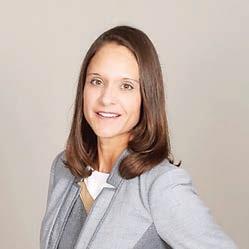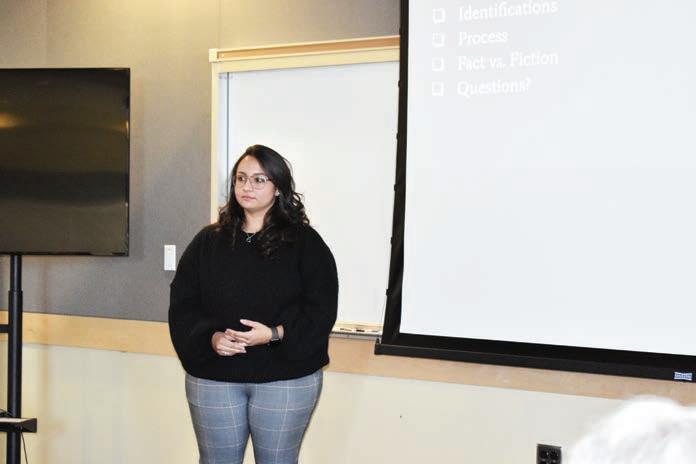
7 minute read
LEGAL
BY BELEN WARD BWARD@COLORADOCOMMUNITYMEDIA.COM
Weld County named former City of Boulder CFO Cheryl Pattelli as the new Chief Financial Offi cer, according to a press release.
“I am excited to start this next chapter with Weld County,” said Pattelli. “I look forward to working with an organization that aligns with my values and beliefs.”
Pattelli takes on Weld County’s fi nancial management processes as well as improving technology to develop systems for fi nancial reports, budgeting, cash fl ow and projections, according to offi cials. She will also manage the county’s accounting team and oversee its daily county government fi nancial operations. Don Warden after 43 years managing Weld County fi nancial operations is retiring by the end of 2022.
“We knew the day would come when Don would want to retire,” said Chairman Steve Moreno. “Filling his shoes is a monumental task, but we are confi dent Ms. Pattelli will be a great fi t with our organization.”
Pattelli brings in 27 years of experience in fi nancial management and accounting in both public and private organizations. From 1996 to 2012 she was the CFO Executive Director of Finance for Kane County Government in Illinois, according to offi cials.
“We conducted a nationwide search for this position,” said Warden. “We knew it had to be the right person with the right experience to continue Weld County on its path of fi nancial success and security. I look forward to spending the next year working with Ms. Pattelli as she transitions into the CFO role.”
Pattelli
to develop systems for fi nancial reports, budgeting, cash fl ow and projections, according to offi cials. the county’s accounting team and oversee its daily county govern-
Youth invited to enter Space Foundation art contest
STAFF REPORT
The Space Foundation is inviting art students to enter the 12th annual International Student Art Contest.
The 2022 International Student Art Contest theme is “Living, Working and Playing on the Moon.” Entries must be original, space-oriented artwork, and can be a drawing, painting, mixed media or digital work.
Founded in 1983, the Space Foundation Headquarters and Discovery Center is a Colorado Springs based nonprofi t that offers “a gateway to information, education and collaboration for space exploration and space-inspired industries that defi ne the global space ecosystem,” its website says.
The art contest encourages youth “to use their creative gifts and curiosity to explore the wonders of space and the exciting possibilities in science, technology, engineering and mathematic fi elds.
The contest provides a chance for students to showcase their talents, and presents an opportunity for parents, teachers and communities to spark a love of STEM in young people through the lens of space,” according to a news release.
There is no cost to enter the contest and any student between the ages of 3 and 18 are eligible.
There will be 25 winners — a fi rst, second and third place for each of eight age categories. One artist will receive the Space Foundation Achievement Award.
Winning artwork will be displayed and shared worldwide, through contest websites and various social media platforms, as well as at the Space Foundation Headquarters and Discovery Center and at the 37th Space Symposium, which will take place April 4-7, 2022, in Colorado Springs.
Deadline to submit entries by Jan. 19, 2022.
Artwork must be submitted online by the student’s teacher, parent or legal guardian who is age 18 or older.
To learn more about the Space Foundation, visit www.spacefoundation.org. To learn more about its Discovery Center, visit www. discoverspace.org.
For more information on the 2022 International Student Art Contest or to submit entries, visit https://art.spacefoundation.org/.
INVESTIGATOR
Manners of death are classifi ed as a natural accident, suicide, homicide or undetermined. The cause of death classifi cation can depend on underlying conditions, disease or some event.
Hospitals can have their own rules, she said. If a patient dies after having beein in the hospital for more than 24 hours and it’s considered a natural death, it’s considered non-reportable and is usually not called into the coroner’s offi ce.
“Some hospitals have rules to call us regardless so we take the information. We don’t sign a death certifi cate if the deceased has been in the hospital long enough for them to know what happened and they feel comfortable sending a death certifi cate, “said Huerta. “If the case is suspicious, we will take jurisdiction and our doctors will do the autopsy when it’s a possible medical misadventure.”

Identifi cation
Finding out who the dead body was is one of the most important jobs and there are several things they can do to positively identify them. Medical implants, for instance usually have registration numbers on them.
“If it’s a badly decomposed body, we can identify someone by their implants, a hip, knee, or something in the spine,” Huerta said.
A person can also be identifi ed by tattoos, dental records, DNA, fi ngerprints. And of course, investigators can identify somebody by their driver’s license — if it’s on them or in a secured location.
Some law enforcement agencies scan fi ngerprints on the scene. If a body is badly decomposed, and the fi ngers are dried they use rubbery silly putty to pull a fi ngerprint.
“We rarely have to do DNA but if we do we go through the Colorado Bureau of Investigation (CBI),” said Huerta.
Death certifi cates
Once a coroner or medical examiner examines the body in the offi ce, they can sign the death certifi cate. A primary physician can also sign a death certifi cate if a patient is in their care and there is no oblivious trauma or medications. If a family chooses to send a body to a funeral home, it becomes that home’s job to sign the death certifi cate.
“They electronically send us documentation to release the body to the funeral home,” said Huerta. “The death record is sent to us, we review it and write in our information of cause or manner of death.

Causes of death
Next, the pair discussed how they fi gure out how a person died. If there are no witnesses, a pathologist can estimate the cause of death and time of death, based on different factors.
“We can’t tell you exactly when they died but we can give you a ballpark,” said Huerta.
Bodies begin breaking down at a cellular level almost right away, Juarez-Dominquez said. The complete decomposition takes about 24-hours. The body starts with Algor Mortis, when the body temperature drops. Rigor mortis comes next as the muscles start to stiffen. That’s followed by Livor Mortis, when the lack of blood circulation starts to become evident, giving the skin a marbled look.
The calendar also has an impact since the decomposition rate is different in a dry summer climate compared to a cold winter. Bodies have been found nearly mummifi ed in hot, dry weather while it can be bloated during wetter times.
If the body is found in a river it has a waxy coating, and it’s hard to determine how long it has been there due to rocks and critters.
“It’s all temperature-dependent sometimes we don’t fi nd skeletal remains,” said Juarez-Dominquez.
“Rivers that are cold, preserve the body better,” said Huerta
Not like TV
There are myths about when an autopsy is being done that a body just sits up.
“When you come into our offi ce you are dead,” Huerta laughed, in answer to a question. “Paramedics put EKGs on a body to make sure there is no activity before that person is brought in to the coroner. The rigor mortis has already been released, so when the body arrives at the coroner or mortician there is no sitting up,” said Huerta.
Huerta said the odor does follow you home.
“That’s when you know you’re in trouble, if you can’t smell it anymore,” she said humorously. “I go straight to the laundry room to take my clothes off and it sticks to your bra.”
That said, it’s an important job with a strong purpose.
“Sometimes families are in denial, and unfortunately we have to break the news. But we’re able to give them answers and hopefully fi nd them a little bit of peace,” said Arely Juarez-Dominquez
“I think a lot of us are in it for the science and it helps when you have that scientifi c mind. Not to say that we are not empathetic people — we’re probably too empathetic. We understand and it’s our job to help the family by doing this and not everybody can do it,” said Huerta.
Arely Juarez-Dominquez is a medical-legal death Investigator. Dominquez answered questions on her process of the job. She goes to the scene of a death to examine the external body. PHOTO BY BELEN WARD



